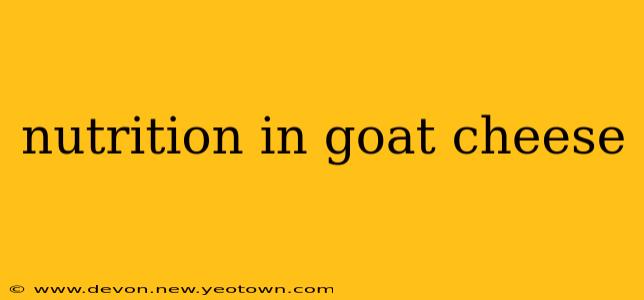Goat cheese, with its tangy zest and creamy texture, has captivated palates for centuries. But beyond its delightful flavor, lies a treasure trove of nutritional benefits often overlooked. This isn't just a fancy cheese; it's a nutritional powerhouse packed with vitamins, minerals, and healthy fats. Let's delve into the creamy depths of goat cheese nutrition and uncover its secrets.
What are the nutritional benefits of goat cheese?
Goat cheese boasts a unique nutritional profile compared to its cow's milk counterpart. It's lower in calories and fat, yet richer in certain vitamins and minerals. Imagine this: you're enjoying a delicious appetizer, and simultaneously nourishing your body with essential nutrients. That's the magic of goat cheese. One serving can provide a significant boost of protein, crucial for building and repairing tissues, and calcium, vital for strong bones and teeth. But the benefits extend far beyond these key players.
Is goat cheese good for weight loss?
This is a question many health-conscious individuals ponder. The answer, like most things in nutrition, is nuanced. Goat cheese is generally lower in fat and calories than many other cheeses. However, weight loss depends on overall caloric intake and dietary habits. A small portion of goat cheese as part of a balanced diet can be a delicious and nutritious addition, but overconsumption can hinder weight loss efforts. Moderation is key.
Is goat cheese healthier than cow's milk cheese?
The "healthier" cheese crown is a tough one to award. Both goat and cow's milk cheeses offer nutritional value. However, goat cheese often holds a slight edge due to its generally lower fat content and higher concentration of certain vitamins and minerals like vitamin A and conjugated linoleic acid (CLA), which has been linked to potential health benefits. Ultimately, the "healthier" choice depends on individual dietary needs and preferences.
Does goat cheese contain lactose?
Yes, goat cheese does contain lactose, although often in smaller amounts than cow's milk cheese. The lactose content varies depending on the cheesemaking process. Individuals with lactose intolerance may find they tolerate goat cheese better than cow's milk cheese, but it's essential to start with small portions and monitor their individual reactions. Some individuals may still experience discomfort, highlighting the importance of personal tolerance.
What are the potential downsides of eating goat cheese?
While generally healthy, goat cheese isn't without potential downsides. Some individuals may experience allergic reactions. It's also relatively high in sodium, so those watching their sodium intake should be mindful of portion sizes. As with any food, moderation is crucial. Finally, the fat content, while lower than some cheeses, should be considered as part of a balanced dietary intake.
What are some ways to incorporate goat cheese into my diet?
The versatility of goat cheese knows no bounds! Crumble it onto salads for a tangy boost, spread it on crackers or bread for a delightful snack, or incorporate it into savory dishes like quiches and pasta sauces. It can also add a unique flavor dimension to both sweet and savory dishes! Its creamy texture lends itself beautifully to various culinary creations.
Conclusion: A Deliciously Nutritious Choice
Goat cheese, with its unique flavor profile and nutritional richness, deserves a prominent place in a balanced diet. Its lower fat content, higher vitamin and mineral profile, and delicious taste make it a versatile and healthy addition to any meal plan. Remember to enjoy it in moderation as part of a varied and balanced diet to reap its maximum nutritional benefits. So, go ahead, indulge in the creamy goodness—your taste buds and your body will thank you.

